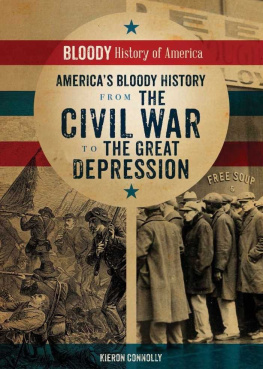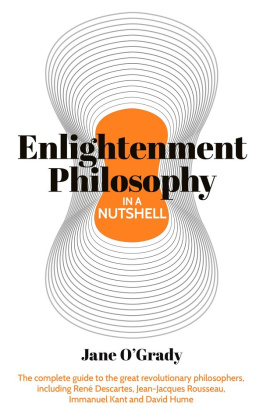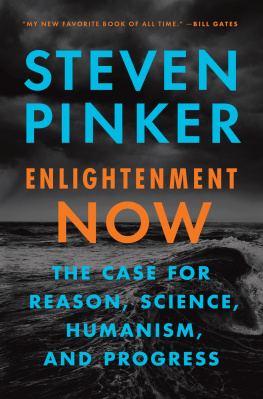A Oneworld Paperback Original
Published by Oneworld Publications 2010
This ebook edition published in 2012
Copyright Kieron OHara 2010
The moral right of Kieron OHara to be identified as the Author of this work has been asserted by him in accordance with the Copyright, Designs and Patents Act 1988
All rights reserved
Copyright under Berne Convention
A CIP record for this title is available from the British Library
ISBN 978-1-85168-709-1
ebook 978-1-78074-153-6
Typeset by Jayvee, Trivandrum, India
Cover design by A. Meaden
Copyright cover photo The Metropolitan Museum of Art,
Purchase, Mr and Mrs Charles Wrightsman Gift,
in honour of Everett Fahy, 1977 (1977.10)
Oneworld Publications
UK: 185 Banbury Road, Oxford OX2 7AR, England
Stay up to date with the latest books, special offers, and exclusive content from Oneworld with our monthly newsletter
Sign up on our website
www.oneworld-publications.com
Preface
The Enlightenment is one of those terms that is often used, about which people have very strong opinions, yet its meaning is very hard to pin down. Some blame it for the bloody disasters of the twentieth century Auschwitz, the Gulags, globalisation, Islamic terrorism. Others feel its legacy needs to be protected against a neo-barbarian onslaught, from supporters of intelligent design, animal rights fanatics, bloggers and Islamic terrorists. For some it signifies the triumph of reason but did reason triumph over ignorance or diversity? Has it brought tolerance, or hypocrisy? Does it support equality of women and men, nonwhite people and whites? Or alternatively is it a covert attempt to force women or nonwhite people to deny their own voices, reject their distinct inheritances and adopt European ways? Is it driving humankind to use science in an insane, unstoppable rape of our planetary resources, or are its discoveries the key to maximising human welfare?
The debates still rage. A short introduction cannot hope to resolve these issues, but it should be possible to provide some pointers. Where are the agreements and disagreements? Where the errors and misconceptions? What significance can we draw when we hear the term Enlightenment used in social or political discourse? That is the aim of this book a deliberately small book, a daunting aim for its author.
As the Enlightenment is such a distributed and heterogeneous group of phenomena, events and institutions, our survey will perforce have to be selective. As I will argue, the Enlightenment is an identifiable movement with underlying continuities, six aspects of which I will sketch in the opening chapter. In the next two chapters, I will briefly examine the progress of the Enlightenment and its distribution in space. The Enlightenment was about ideas, which the next five chapters will consider. Chapter four will sketch the intellectual origins of the Enlightenment, looking at its precursors and its founders. Chapter five will look at the philosophy of the era, including the central aspects of the philosophy of knowledge (epistemology) and the philosophy of mind. Chapter six will review the most abiding philosophical developments in political philosophy. Chapter seven will look at the new scientific views of nature, while Chapter eight will examine religious ideas. Next, chapter nine will look at the effects of the revolution in ideas on artistic expression. Chapter ten will consider the legacy of the Enlightenment in the present day and review attitudes, both pro and anti, and the final chapter will draw on all of these elements in briefly examining the significance of Enlightenment ideas during the last two hundred years.
This is a survey of a long period of time, which ranges over two continents and several kinds of artistic and political endeavour. As is clear from the table of contents, I have chosen to arrange material thematically rather than chronologically. Many names, not all of them familiar, crop up, and rather than interrupt the text for introductions I have placed the names of some of the more important figures in a list at the back of the book, which gives their dates and nationalities, as well as a very brief characterisation of their achievements. This, I hope, will serve to orient the reader as he or she moves through the text, and also act as a starting point for further study. The dates of birth and death of those not mentioned in the biographical section will be given in the text upon their first appearance. Throughout the book, names and titles have been anglicised, except where a non-English name is more familiar.
The major writers of the Enlightenment are relatively little-read in the twenty-first century. Some works remain popular Candide, Gullivers Travels, Robinson Crusoe but many of the great philosophical and historical works, such as Lockes Essay, Humes Treatise, Kants Critique of Pure Reason or Gibbons Decline and Fall of the Roman Empire are more referred to than read, while in the Anglophone world at least, remarkably few readers recognise the names of the greatest philosophes, including Diderot, Condorcet and Montesquieu. There are some excellent anthologies of Enlightenment texts, and in this book I have purposely leaned heavily on Isaac Kramnicks The PortableEnlightenment Reader, which happily remains in print, in order that the student might be able to find a selection of excerpts from a good range of Enlightened writers, scientists and thinkers in one convenient place. In the further resources section at the end of the book I will indicate which of my quotes can be found among the extracts collected in Kramnick. I also suggest secondary sources for the issues addressed in each chapter; each source appears once to avoid undue repetition, but many of them have wide applicability and are worth reading in a number of contexts. I also provide a list of important primary texts or useful anthologies of original pieces. Most of these are a joy to read, and I hope this little guide will open that enjoyment for the reader.










